The Summer Olympics in Paris has ignited a sports craze. Indeed, the University of Macau (UM), which boasts a vibrant sports culture, is no exception. Despite their busy schedules, UM faculty, students, and staff often engage in physical activities on campus. We will explore how UM cultivates a healthy sports culture and fosters the spirit of sportsmanship among its community.
Ample opportunities for sports participation
The Chinese proverb ‘One minute of glory on stage requires ten years of hard work off stage’ aptly describes the dedication of athletes, be it in their preparations for the Olympic Games or their engagement in competitive sports. UM athletes also exemplify this dedication. In the university’s sports arenas, athletes train diligently from morning to night, tirelessly gearing up for competitions. For example, the UM Swimming Team members utilise their summer breaks for intensive training in the pool. They commit themselves to continuous swimming to strengthen their core muscles, boost their explosive strength, and enhance their endurance, all in an effort to achieve better results in their sporting pursuits.
Beyond the campus sports arenas, UM athletes also utilise the sports facilities available in UM residential colleges. Each residential college is equipped with sports amenities such as table tennis tables and fitness rooms to encourage students to incorporate sports into their daily routines. Moreover, UM organises the CICA (Committee on Inter-College Affairs) Masters’ Cup every year, which features various competitive events. Among them, the cheerleading competition always captures the spotlight. This year, the cheerleading team from Stanley Ho East Asia College, led by captain Iun Chi Hin, a psychology student, won the championship. Iun shares, ‘The pyramid dance we performed in the competition required rigorous training to achieve perfection. It was fulfilling to witness the realisation of our goal through collaborative efforts.’
UM students have the opportunity to join a variety of sports associations that match their interests, from the Archery Association to the Korfball Club and the Rock Climbing Club, where they can train together with peers who share their passion. The Squash Society, for example, has more than 200 student members and conducts regular training sessions every week. In addition, it offers squash experience classes for beginners. Lu Min Hao, a master’s student in Physical Education and Sport Studies and former president of the Squash Society, organised many activities to promote squash during his tenure. He says, ‘We wanted to share with more students the fun of playing squash and were happy to practice with them and improve their skills.’
Choi Chi Son, an economics student, is a member of the table tennis team, dance team, and cheerleading team of Lui Che Woo College. Thanks to the encouragement and guidance from her teammates, Choi’s athletic skills have significantly improved. Reflecting on her progress, she says, ‘I have noticed a significant boost in my efficiency after each training session. In addition, exercising helps reduce my stress. Therefore, I make it a point to set aside my academic commitments during training to fully enjoy the sports experience.’
Enhancing training effectiveness through research
The exceptional performance of athletes is tightly linked to the application of precise sports science. Kong Zhaowei, associate dean of the Faculty of Education (FED), leads a research team focused on exercise optimisation and dietary intervention. Their research aims to boost athletes’ physical fitness and improve the health of sedentary individuals. As a renowned scholar in studies about simulated hypoxia training and one of the world’s top 30 experts in high-intensity interval training, Prof Kong emphasises, ‘Physical training is a long-term commitment, so it is important to exercise correctly.’
To facilitate research on professional athletes, Prof Kong has established a hypoxic training laboratory in FED. By simulating the hypoxic environment at high altitudes, the laboratory enables researchers to conduct individualised and precise studies on athletes with different physical conditions. This research has yielded significant findings, which have been subsequently published in international journals. Prof Kong explains the significance of this research, saying, ‘Hypoxic environments trigger a range of physiological regulatory responses in the human body, including increased red blood cell production, lung expansion, and blood vessel dilation. These adaptive changes can consistently improve the overall physical fitness of athletes.’ At the end of last year, Prof Kong, along with four doctoral students and one master’s student in FED, presented their research at the 20th Annual Meeting of the Society of Chinese Scholars on Exercise Physiology and Fitness, where they won five awards. Their work has provided new perspectives for interdisciplinary research between sports science, biomechanics, nutrition, and psychology.
For the general public, Prof Kong recommends a high-intensity interval training called ‘one-minute all-out exercise’. This routine consists of a series of six-second sprints (preferably on exercise bicycles to minimise the risk of injury) followed by nine seconds of rest, repeated for a total of 10 sets. Prof Kong explains, ‘Consistently performing this training can maintain a robust level of HRV (heart rate variability), which benefits heart health and activates the parasympathetic nervous system, helping to regulate mood and improve sleep quality.’
The hub of international sports events
UM has an extensive array of sports facilities, including more than 35 indoor and outdoor courts, an international-standard swimming pool, archery ranges, climbing walls, and bouldering walls. Leveraging these resources, the university hosts and co-organises various international sports events every year, including the recent ISF World School Basketball Championship and the first University Women’s Volleyball Invitational Tournament. These events attract athletes from around the world, providing a platform for them to learn from each other, promote exchanges, and foster friendships.
Vanessa Muianga is a student from the Pedagogical University of Maputo in Mozambique who participated in the University Women’s Volleyball Invitational Tournament. Reflecting on this experience, she shares, ‘It was our first visit to Macao. The tournament not only enabled us to make friends with Mozambican students living in Macao, but also to connect with local teachers and students. The best way we could show our appreciation was by giving our best performance on the court and learning together with students from other universities.’
Chai Xiaofan, vice captain of the UM Women’s Volleyball Team, says that the event was a great platform for their team to improve their skills, surpass previous performances, and achieve goals together. She adds, ‘I was very happy to have the opportunity to compete with teams from universities from different places. These experiences are crucial for our continuous growth.’
UM’s exceptional sports environment has established the university as a global melting pot for athletes where they forge lasting friendships. Moreover, the university attracts numerous local sports enthusiasts to witness the performances of athletes representing various countries and regions. UM Vice Rector (Global Affairs) Rui Martins notes, ‘The competitions held at UM this year have seen the participation of athletes from more than 20 countries and regions, including Mozambique, Greece, France, Turkey, New Zealand, China, Hong Kong, and Macao. These events not only facilitate sports exchanges among universities, but also contribute to Macao’s development into a “City of Sports”. More importantly, UM provides a platform for students worldwide to cultivate international friendships.’
Fostering a healthy and uplifting campus culture
The Paris Olympics exemplifies the essence of sports, highlighting virtues such as perseverance, fairness, and justice. These are also values that UM members aspire to embody in their studies and work. The university is dedicated to fostering a healthy and uplifting campus culture. By taking advantage of the university’s sports facilities and incorporating physical exercise into their everyday lives, UM members not only enhance their physical fitness but also cultivate determination.
Text: Kelvin U, UM Reporter Wang Chuyue
English translation: Bess Che
Photos: Editorial Board, with some provided by the interviewees
Source: My UM Issue 135
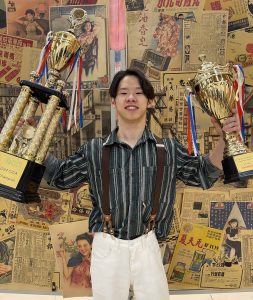
Iun Chi Hin
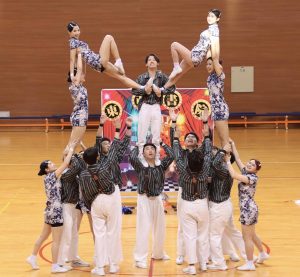
The cheerleading team from Stanley Ho East Asia College wins the championship at the CICA Masters’ Cup
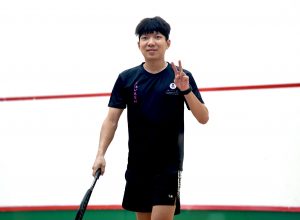
Lu Min Hao
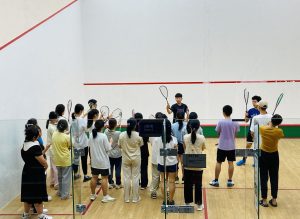
One of the campus activities to promote squash

Choi Chi Son
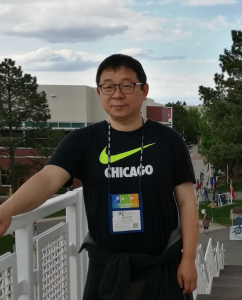
Prof Kong Zhaowei

UM doctoral students present their research findings at an international conference on sports science
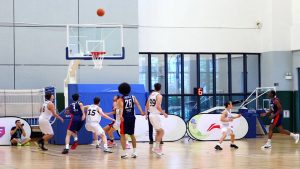
UM hosts the ISF World School Basketball Championship
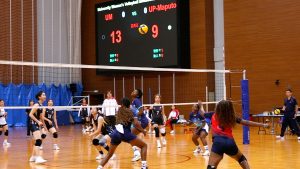
UM hosts the University Women’s Volleyball Invitational Tournament
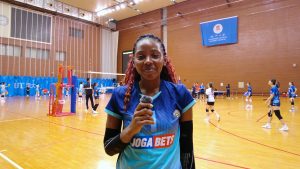
Vanessa Muianga
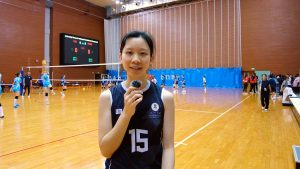
Chai Xiaofan
